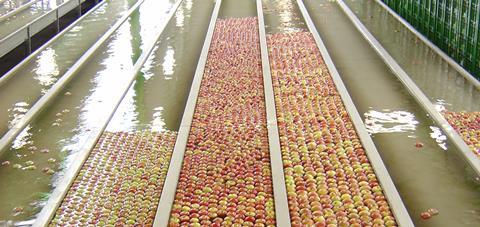
The fate of one of Austria’s largest apple suppliers remains very much in the balance ahead of a decision, expected some time next week, about whether to offer the company a chance to continue under new ownership.
Steirerfrucht, a wholesaler based 30km north-east of Graz in Austria’s apple heartland of Styria, along with its packing subsidiary Verpackers Apfel-Land, filed for bankruptcy in early Marchwith a reported €19m in debts owed to the Raiffeisenlandesbank Steiermark.
The companies were subsequently placed in the care of administrators, who were handed the task of finding potential investors willing to rescue the business.
According to press reports in Austria itself, the most likely buyer is Obst Partner Steiermark (Opst), the producer group linked to export organisation Eva Handels and well-known apple brands including Frisch-Saftig-Steirisch (Fresh-Juicy-Styrian), Eva and Eva Prime.
As it stands, the fruit currently in the care of Steirerfrucht remains the property of Opst and, as such, represents a vested interest in a positive outcome for the growers in question.
Opst managing director David Eibel confirmed late last week in an interview with the Kleine Zeitung that the organisation was an “interested” party, describing the availability of Steirerfrucht as “an historic opportunity for growers to get access to the entire value chain”.
With the price paid to take over the group reportedly expected to be in the region of €10m to €15m, a great deal of uncertainty remains regarding Opst’s willingness to invest millions in what is ultimately a failed venture with assets including expensive new packhouse operations – said to be running at no more than two-thirds of capacity – adding to the risk involved in such a takeover.
Rupert Gsöls, president of Austrian Fruit Producers Assocation and chairman of the Association of Styrian Commercial Fruit Growers, recently told another Austrian publication, Vienna-based newspaper Kurier, that the failure of such a large marketing organisation was “a disaster” created by a combination of adverse factors.
“We know that for some time things were not going well. Investments were made in 2007 that were aimed at getting the operation to be used more. Then the global economic crisis came along and later the Russian crisis,” he explained.
“Fruit growers have been confronted in recent years with a late frost, then a massive drought and then Russian sanctions, which have not been good for fruit growing.”
Steirerfrucht was formed in 1990 following the merger of five fruit marketing organisations – Feldbach, Graz-Liebenau, Ilz, Hartberg and Weiz – in order to share storage, sorting, packaging and marketing operations.






